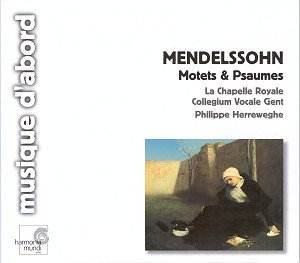This
welcome reissue of beautifully recorded performances from 1984
reinforces my view that Mendelssohn is too often represented by
the same few pieces which are not necessarily his best. Of course
the Scottish and Italian Symphonies, to name but two examples,
are splendid pieces in their own right, but relatively speaking
they are over-played and over-recorded, and the composer did better
elsewhere: in chamber music and in vocal works such as these.
Yet
this collection is no more than a representative sample of a field
in which Mendelssohn was prolific. And besides that there are
the larger works, such as the oratorios and the setting of Goethe's
Die erste Walpurgisnacht; but these smaller pieces find him at
his most inspired.
Philippe
Herreweghe is a major artist and deals with the issues of scale
and phrase with consummate judgement. The chosen acoustic is absolutely
right too, allowing for plenty of bloom in the sound amid a spacious
and expansive context.
Herreweghe's
La Chapelle Royale and Collegium Vocale of Ghent perform with
the utmost sensitivity of line and phrase, while the acoustic
really does allow the music to float away when required, or conversely
to make maximum impact during climactic phases. There might be
one or two queries about the editions used. Opus 69, for example,
is a group of 'English Church Pieces' from 1847, and the featured
item, Herr nun lässest du deinen Diener, is a setting of
the Nunc Dimittis. Perhaps these European editions should be seen
as a tribute to Mendelssohn's sophisticated eclecticism. But in
these performances the versions sung in German do sound entirely
right, for example the Opus 79 Anthems, of which the same question
can be asked.
There
are abundant examples of really beautiful singing, beautifully
recorded. In selecting for special praise the lower and upper
voice contrasts at the beginning of Mitten wir im Leben sind,
the third of the Opus 23 Motets, the tribute is as much to Mendelssohn's
beautifully judged scoring and pitching of the parts as to the
tone quality and pacing of the performers. There is nothing finer
on the disc, despite this music being from 1830 when the composer
was just twenty-one. But then not even Mozart outshines Mendelssohn
in the child prodigy-teenage master stakes.
Greta
de Reyghere is a fine soprano soloist in this repertoire. The
balancing does not give her undue favour in the recorded perspective,
which is therefore absolutely true to the musical aesthetic, since
under-statement and beauty of line and texture have priority at
every turn.
The
clearest evidence of this occurs in the final item in the sequence,
the fresh and ardent hymn Hear my Prayer, O Lord, in which the
opening phase places the solo voice beautifully against the tasteful
tones of the organ.
There
is an interesting accompanying essay on Mendelssohn's sacred vocal
music by Herreweghe himself. However, this would have been better
as an extra item to a conventional note itemising the background
and nature of each individual piece. Alas nothing of the latter
type is included. There are full texts and translations, printed
and presented very clearly.
Terry
Barfoot
